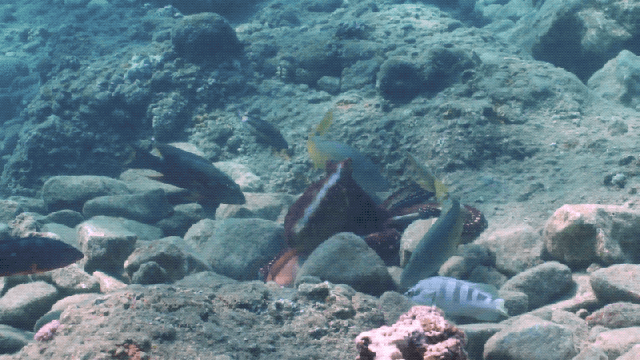Upsetting but strangely satisfying new research documents octopuses punching fish during collaborative feeding sessions. The octopuses primarily do it for practical reasons, but sometimes these underwater jabs seem to be purely spiteful.
We learned so many disturbing things this year, and we regretfully have to add another item to the list: Octopuses like to punch fish. As the authors speculate in their paper, published in Ecology, these punches are thrown to “prevent exploitation and ensure collaboration.” In some cases, however, the octopus-on-fish violence couldn’t be connected to anything in particular. In other words, the octopuses were being total dicks. That, or there’s something about this punching behaviour that’s still not understood.
In total, the researchers documented eight distinct events (video here) in which the octopuses could be seen punching fish. These occurred in the Red Sea between 2018 and 2019 off the coasts of Israel and Egypt. The octopuses performed “a swift, explosive motion with one arm directed at a specific fish partner, which we refer to as punching,” the authors write. Victims included tailspot squirrelfish, black tip, yellow-saddle, and Red Sea goatfishes.
“These multiple observations involving different octopuses in different locations suggest that punching serves a concrete purpose in [interspecies] interactions,” according to the paper.
Octopuses and fishes are known to hunt together, taking advantage of the other’s morphology and hunting strategy. Since multiple partners join, this creates a complex network where investment and pay-off can be unbalanced, giving rise to partner control mechanisms. @SimonGingins pic.twitter.com/MEyyaIZaxO
— Eduardo Sampaio (@OctoEduardo) December 18, 2020
Interspecies cooperation is rare, but it does happen. Coyotes and badgers sometimes join forces to hunt together, as do groupers and eels. In a recent tweet, Eduardo Sampaio, a co-author of the new study from the Max Planck Institute of Animal Behaviour and the University of Lisbon, said octopuses and fish hunt together to take advantage of each other’s physical attributes and specialised hunting skills.
Groupers and other species of fish hunt together with octopuses in sessions lasting upwards of an hour. The fish act as sentinels, scouring the seafloor for a potential meal. When a victim is spotted, the fish gestures toward the prey, which sets the octopus into motion. The agile octopus pursues the prey — sometimes having to reach into rocks and coral reefs — and the spoils of war are shared among the group.
Sometimes, however, conflicts and inequities can arise. In “this complex social network of interactions,” the authors write, “partner control mechanisms might emerge in order to prevent exploitation and ensure collaboration.” That’s where the punches come in, “where different Octopus cyanea individuals engage in active displacement [i.e. punching the fish away] of partner fish during collaborative hunting,” according to the paper. The punches could be thrown by the octopus to maintain control over fish behaviour, to banish certain fish from the group, to deter them from prey, or for purely selfish reasons — that is, to gain immediate access to a meal, as the authors speculate.
Of the eight events, however, two could not be immediately linked to a hunting episode or access to nearby prey. These punches occurred “in the absence of immediate benefits,” and the authors suggest two possible motivations, as they write:
In the first one, benefits are disregarded entirely by the octopus, and punching is a spiteful behaviour, used to impose a cost on the fish regardless of self-cost…In the other theoretical scenario, punching may be a form of aggression with delayed benefits…where the octopus pays a small cost to impose a heavier one on the misbehaving partner, in an effort to promote collaborative behaviour in the following interactions.
On that last point, it would mean the octopuses are planning ahead for future hunting sessions, which would actually be pretty cool if true. Well, except for the coercive aspect, of course.
And indeed, there’s still much to learn about these surprising interactions. Future work will be required to validate the team’s observations and hypothesised reasons for the behaviour. But I wouldn’t throw it past them — octopuses are smart, emotionally complicated, and a bit mischievous.
